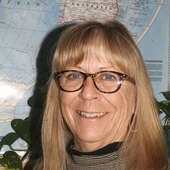- Research tips and McCook Brick Company- solid as a brick (12/16/24)
- Big Give appreciation and some railroad characters (11/15/24)
- George Randel becomes a landowner, gets married, and takes in a Buffalo Bill show (9/20/24)
- The memoirs of George F. Randel, early settler of Red Willow County (9/12/24)
- Vietnam War Memorial honors Nebraskans who served (6/13/24)
- McCook business promotions - just prior to 1893 stock market crash (5/30/24)
- Shall we dance? Meet you at the Gayway (12/8/23)
No secrets in a small town
Friday, March 24, 2017

My great-grandmother, Mary Eckert Davison, ran the stage coach stop in Ickes, Nebraska. When the telephone was invented, the driver would call ahead to her home (where the Post Office also existed) to let her know how many riders he was carrying so she knew how much lunch to prepare.
When my grandmother and grandfather were married, his sister, Dessie Davison Anton, lived in Sidney, Nebraska. Dessie, the family pianist, would on Sundays call up her family in Dalton, lay the old handset next to the piano, and the operator in Dalton would connect everyone who wanted to listen into the party line as my great aunt played the piano for the folks at home.
Party lines remained the prominent phone service for many years, especially in rural areas. Even in the 1950s living on the acreage outside of Indianola, had my father not been a railroader subject to call 24 hours a day, we would have had a party line, which for those of you who aren’t old enough to remember, meant that anyone living close to you on that “party line” could pick up the phone and listen to your conversations, no wire- tap needed!
Even though we had a private line, I certainly didn’t have any privacy with my phone conversations. Our phone then was mounted to the wall, in the living room, no chair within 5 feet of it, and a cord only long enough that a person could stand comfortably and talk. Talk, that is, in front of the whole family who were sitting in the same room, a fairly uncomfortable situation for a teenager.
Which is why, in this day and age of cell phones, I tell my grandchildren that if they are speaking with their parents concerning permission to do anything related to me, they will do so in the same room as I am in so that I can hear the conversation. I’m not sure when children were told they were guaranteed privacy but there’s no court of appeal at grandma’s house.
So here’s a perfect example of how little “privacy” existed in the late 1800’s. From the Benkelman Democrat, April 5, 1889: “Last Sunday evening, a pair of young men arrived in Benkelman from the east and registered at the Commercial Hotel as “Charley Yountz and Brother.” They immediately retired, both occupying the same room, leaving a call for one of the night trains. At the appointed time, Landlord Scott called the “Brothers,” one of whom had been transformed during the night from a vulgar man to a very pretty little woman. The parties are supposed to be a prominent young business man of McCook, and his partner the daughter of a leading resident of the boom city.”
Another bit of news from the McCook Tribune, May 12, 1887: “The tine horn gamblers and dissolute females of the city were arrested and fined, the close of last week. The dose can be repeated frequently with good effect-the weeding out of a large number of the disreputables. The net might be enlarged.”
If your church has membership registries from the past, we are digitalizing those for area churches. The process does not harm the originals and enables the society to preserve the historic records for public use and provides the church with a digital copy, protecting the originals from destruction by researchers.
Open library remains on Wednesdays, 1-4 p.m., at 110 West C, Suite M-3. We have been receiving a steady stream of record and photo donations in the last few weeks which is greatly appreciated. As soon as catalogued, we will have new Ohio records and a book on O’Dea genealogy for in-house research.

